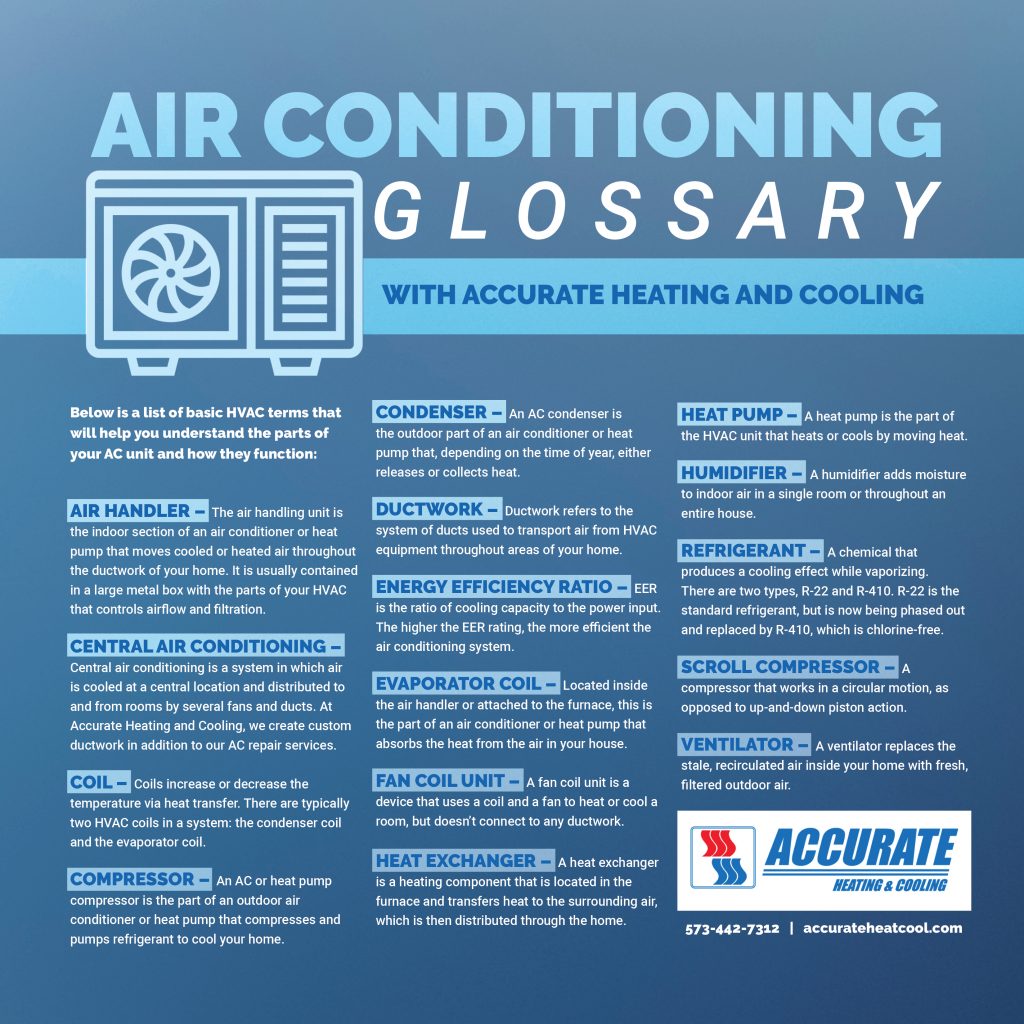19 Jun Common Air Conditioning Terms to Remember from Experts in AC Repair Columbia, Mo
Common Air Conditioning Terms to Remember from Experts in AC Repair Columbia, Mo
How well do you know your AC unit? As a home or business owner, it’s important to understand the basics of your air conditioning unit. This way, if trouble arises, you’ll be able to diagnose the problem more quickly, and our team can have it fixed in no time. In this blog, we’ll go over the basic parts of an AC unit, as well as some FAQ’s we often get. Armed with this information, you’ll be ready if your air conditioning unit malfunctions. Have more questions? Dealing with an AC unit issue right now? Give us a call! Accurate Heating and Cooling provides AC Repair in Columbia, Mo, alongside other HVAC services.
Basic Parts of Your AC Unit and When You Need Air Conditioner Repair in Columbia, Mo
Below is a list of basic HVAC terms that will help you understand the parts of your AC unit and how they function.
Air Handler
- The air handling unit is the indoor section of an air conditioner or heat pump that moves cooled or heated air throughout the ductwork of your home. It is usually contained in a large metal box with the parts of your HVAC that controls airflow and filtration.
Central Air Conditioning
- Central air conditioning is a system in which air is cooled at a central location and distributed to and from rooms by several fans and ducts. At Accurate Heating and Cooling, we create custom ductwork in addition to our AC repair services.
Coil
- Coils increase or decrease the temperature via heat transfer. There are typically two HVAC coils in a system: the condenser coil and the evaporator coil.
Compressor
- An AC or heat pump compressor is the part of an outdoor air conditioner or heat pump that compresses and pumps refrigerant to cool your home.
Condenser
- An AC condenser is the outdoor part of an air conditioner or heat pump that, depending on the time of year, either releases or collects heat.
Ductwork
- Ductwork refers to the system of ducts used to transport air from HVAC equipment throughout areas of your home.
Energy Efficiency Ratio (EER)
- EER is the ratio of cooling capacity to the power input. The higher the EER rating, the more efficient the air conditioning system.
Evaporator Coil
- Located inside the air handler or attached to the furnace, this is the part of an air conditioner or heat pump that absorbs the heat from the air in your house.
Fan Coil Unit
- A fan coil unit is a device that uses a coil and a fan to heat or cool a room, but doesn’t connect to any ductwork.
Heat Exchanger
- A heat exchanger is a heating component that is located in the furnace and transfers heat to the surrounding air, which is then distributed through the home.
Heat Pump
- A heat pump is the part of the HVAC unit that heats or cools by moving heat.
Humidifier
- A humidifier adds moisture to indoor air in a single room or throughout an entire house.
Refrigerant
- A chemical that produces a cooling effect while vaporizing. There are two types, R-22 and R-410. R-22 is the standard refrigerant, but is now being phased out and replaced by R-410, which is chlorine-free.
Scroll Compressor
- A compressor that works in a circular motion, as opposed to up-and-down piston action.
Ventilator
- A ventilator replaces the stale, recirculated air inside your home with fresh, filtered outdoor air.
Air Conditioner FAQ’s
What’s wrong with my air conditioner?
- It could be a variety of things. But first, think about how old your unit is. Most HVAC systems last 15-20 years, so if yours is this age or older, it may be time for a replacement.
What are common air conditioner problems?
- Dirty filters, refrigerant leaks, drainage, breakers or fuses, and faulty coils can all be culprits of a faulty AC unit. It’s best to have a professional take a look, so give us a call if you’re experiencing problems with your air conditioner.
How often should I have my air conditioner serviced?
- We advise getting your AC unit checked and serviced twice a year, once a year at the least. Not only will this promote your unit’s longevity, but it also keep your energy costs lower.
When should I replace my air conditioner unit?
- About every 15-20 years.

Contact Accurate Heating & Cooling for Expert AC Repair in Columbia, Mo!
If you’re experiencing issues with your air conditioning unit, give us a call at Accurate Heating and Cooling. We are experts in AC Repair in Columbia, Mo, in addition to other HVAC services.

No Comments